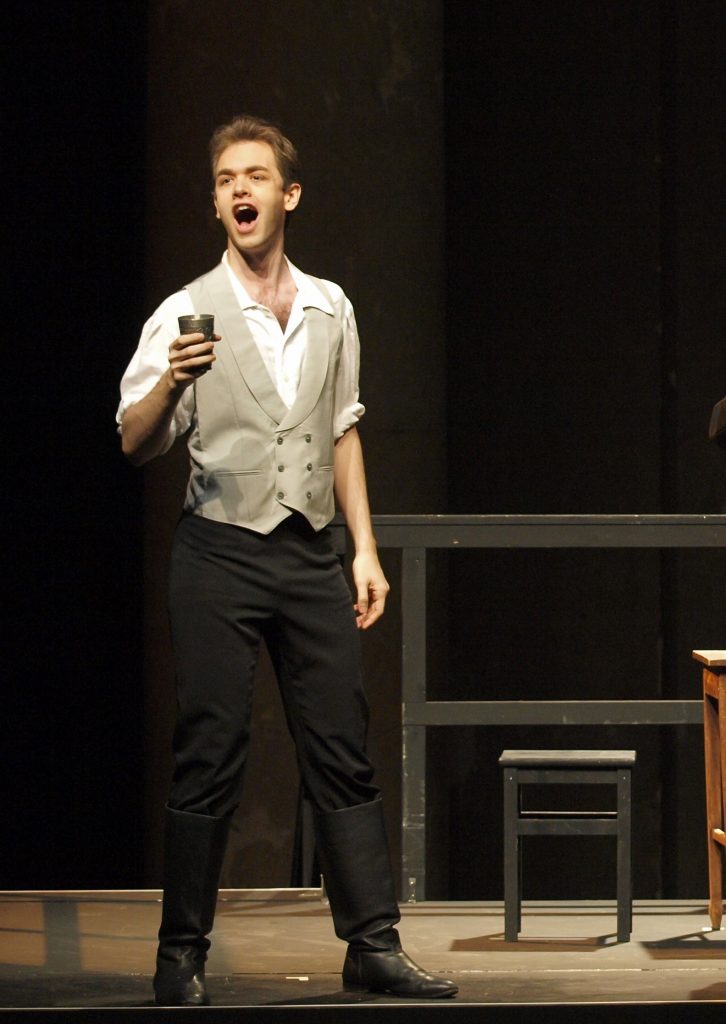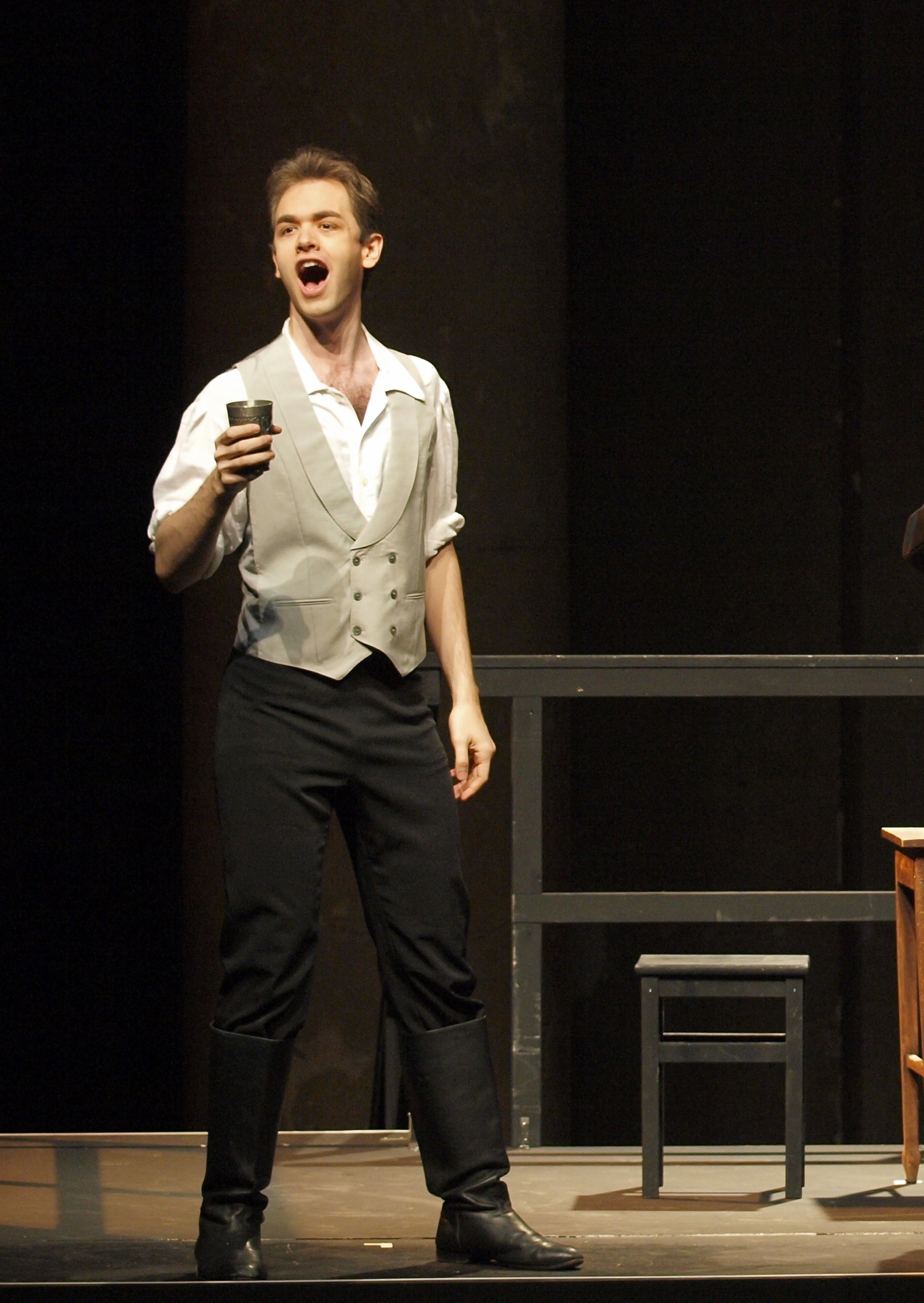Dropping Barriers: What opera singers study, and how it can help you learn languages easier

Recently there was an interesting article on Lifehacker called I learned to speak four languages in a few years. Here's how by Gabriel Wyner. He got in touch with me and asked to guest post about his relevant experience as an Opera Singer (as you can see in the photo!) to help him learn several languages really well, and I was glad to share his thoughts here!
Over to you Gabriel!
If you have the chance to see a vocal studio recital at a music conservatory, you'll often see something remarkable.
In general, the students will sing pieces in various languages with varying degrees of success, and the audience will clap, and the singers will bow and this will go on for 40-60 minutes until the end, when the students usually sing pieces in their native languages. At this moment, something magical can happen. The singer and the audience both relax.
This is the moment when the singer's language barrier disappears, and he is able to express himself fully, and even when the audience and the singer don't speak the same native language, they will be able to communicate on a deep, emotional level.
Dropping this barrier in a foreign language is a serious challenge and it comes with a serious reward – my first moment without that barrier in German was what got me addicted to both singing and language study from that point forward.
Singing and language are inextricably linked; singing is, in some ways, slow motion, concentrated speech. At its core, the goal of a singer's training is the same as the goal of anyone having a meaningful conversation – the goal of communicating with others.
And so, singers have a lot to offer language learners (at least, those who wish to communicate with others; some people study languages for their literature, or for the mental fun of it, for example, and they may find more suitable advice elsewhere!):
Barrier 1: Accent
A singer's training focuses on dropping barriers between himself and his audience – language barriers, personal barriers, etc. – and parts of this training can be helpful for all language learners.
One of the first steps in this training involves eliminating the accent barriers between the singer and his audience, and I'd like to note that there are two barriers here: one, a German audience listening to someone sing in German with a heavy American accent will be uncomfortable, even if the singing is wonderful. There's a wall between the audience and the singer, because the singer isn't really communicating in their language; the audience needs to struggle to understand what the singer is singing.
Secondly, the singer is never really comfortable in this language; he's struggling to make the sounds and doesn't quite know what he's doing. This is nerve-wracking, and makes both singer and audience uncomfortable, even if the audience isn't German. These barriers are not unique to singing; anyone who tries to speak a foreign language will struggle with the exact same two barriers: native speakers will tend to be more distant when they try to understand a foreign accent, and you will be less comfortable when you're wrestling with the foreign sounds.
In a formal conservatory education, singers overcome this barrier in 2-4 semesters of diction classes, where a singer learns the sounds of his own language, as well as the three main languages of classical music: German, French and Italian (and sometimes Russian, too!).
But wait a second! Why learn the sounds of a language you already speak?
As I mentioned above, singing is a sort of slow motion speech. If you say the word “Ride”, it takes you about a half of a second and if you're an English native speaker, the amount of time you spend thinking about what your mouth is doing is approximately nil.
Now, if you're singing the word “Ride” for 5 seconds, you suddenly have a whole host of decisions to make. Ride is composed of five sounds, depending upon how you count them. You have the initial R, you have two vowels – an “ah” and an “ih” – you have a D, and if you listen for it, you even have a quick “uh” after your D (otherwise it would sound more like “Rite”).
How much time are you going to spend on each of these sounds? If you experiment, you'll find that RRRRRide and Rah-EEEEEEEEEEEde are both less than excellent options, and in the end, you'll probably settle on spending as much time as possible on the “ah” vowel.
Singers learn this stuff because these choices are not necessarily simple or obvious, and they use the International Phonetic Alphabet (IPA) as a helpful tool. IPA shows you all of the sounds of a word, and “Ride” in IPA is written [ɹaɪd(ə)] (I've marked the “shadow vowel” after the D in parenthesis. Sometimes it's written in superscript, like this ɹaɪdə, and sometimes it's not written at all). IPA is a powerful tool because you can see every sound in a word, and with a little bit of practice, you can hear it in your head. This is helpful for singing, and extremely helpful for learning a new language.
Many French learners, for instance, have difficulty noticing the difference between the words “rue” and “roux”. French is a nice example because the spellings can be so complex. Words that rhyme with “rue” include perdu, dû, eu (only for past tense of avoir as in j'ai eu), aigüe, etc. (and roux, roue, tout, où, and goût all rhyme with each other).
These rhymes are a lot easier to recognize in IPA: rue, perdu, dû, eu and aigüe turn into [ʁy], [pɛʁdy], [dy], [y], [egy]; all these words end in the sound [y] (and all the others end in [u]: [ʁu], [ʁu], [tu], [u], [gu]). Making a few flashcards with spelling rules (-ou is pronounced [u], -û is [y], etc.) makes French much easier, once you're familiar with the IPA symbols. Simply knowing how IPA and the spelling rules of the language interact is about half of the story – the other half is in learning how to hear and say the sounds accurately.
Learning this takes two steps:
- Step 1: Theory
You need to understand what the symbols mean in terms of your mouth and tongue. For instance, [u] is the same sound as in the English word “food”. Your lips are rounded, your tongue is high up, and it's pulled back near your soft palate. [y] also has rounded lips, and your tongue is still high up, but this time, it's much more forward in your mouth – in the same place as [i] (“Cheese”). I've made a video series that explains these concepts over here: http://youtu.be/-
- Step 2: Practice
Once you know what the symbols mean, you need to listen to recordings of native speakers saying various words while you listen for those sounds.
Go to http://www.forvo.com/ and put in example words like “roux” and “rue” and listen to the differences between them. Write out a list of words with difficult sounds and have someone on http://rhinospike.com record them for you. Try to mimic the recordings.
Once you've wrapped your head around the theory behind the sounds, it should take you 1-2 weeks of practice to start getting a real feel for those sounds in your mouth and to really hear the differences between them.
Barrier 2: Automaticity – Practicing the simple parts of a complex whole
Classical singing is one of the most natural and simultaneously unnatural art forms in existence.
Humans have been singing for thousands of years – it's part of our nature. And yet, over the past 450 years, an art form has developed where a single person is supposed to get behind a 100 piece orchestra with trumpets, flutes, basses and horns and sing so loudly that they can fill a 3000 person concert hall – and do it beautifully, with a perfect accent and perfect style, all while hanging off of a chandelier in a giant viking outfit, or whatever else the director has in mind.
Each aspect of singing can be considered simple – in general, you need to raise your soft palate, release your jaw, breath into your diaphragm, etc. The common joke is that classical singing is just a matter of doing 18 very simple things all at once, and what you learn pretty quickly is that focusing on all 18 things (I think it's more like 50, honestly) is impossible.
Since our brains just can't handle more than 1 or 2 things at a time, the real goal is to make everything automatic with practice.
A singer who is worrying about the location of his tongue or jaw, or whether he remembers the next word in his text will have an uncomfortable time on stage, and the audience will usually feel that discomfort, too.
To solve this, singers take each aspect of their art and practice it separately: we'll take a piece of music and learn the rhythm, and then we'll learn the notes, and then the meaning of the words, and the pronunciation of the words, how those words feel in our mouths when we sing high or low, how it feels to do it with a raised soft palate, or with a released jaw, and on and on and on.
We alternate working on one specific aspect of singing with putting them all together in practice performances. By the time we get to the real performance, if we've done our jobs well, we can focus on what we mean to express, instead of how to express it.
Sound familiar? Languages, too, are comprised of tiny, simple pieces. Learning a single word or conjugation is easy. It's just putting all of the tiny pieces together naturally that can be difficult.
So rather than focusing on trying to put all of these grammar rules and vocabulary rules together, perfectly, and all at once, practice them separately. I like to use Spaced Repetition software like Anki to break every complex language concept down into its simplest components – the words, the individual conjugations, the connecting words, any irregular pronunciations, etc.
Then I can practice putting them together when speaking. This process, of working on the small parts individually and of working on combining them them when reading/listening/
Gabriel is an opera singer, and part of his job involves singing in Italian, French, German, English, and Russian (and sometimes Czech, Spanish, Hebrew and Latin). After several unsuccessful language learning attempts, he tried his first immersion program in German in 2004 and got hooked.
Since then, he set out to see if he could become fluent in all of these languages. He's gotten through German, French, and Italian and is aiming for fluency in Russian by September. He's currently living and singing in Vienna, Austria, where he has been teaching English using these methods and has recently finished writing a book on language learning.
The companion website is at www.TowerofBabelfish.com (Edit: Now changed to fluent-forever.com), where these ideas are described in a bit more detail.



Social